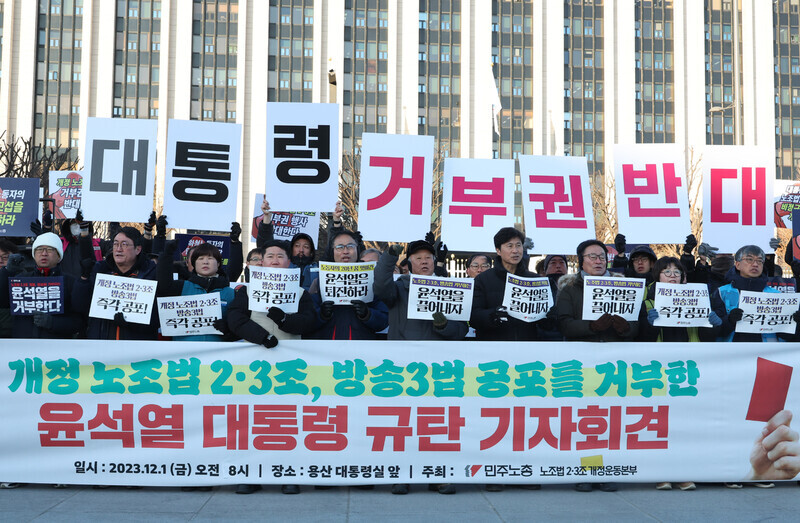hankyoreh
Links to other country sites 다른 나라 사이트 링크
[Editorial] By blocking union bill, Yoon further strains government-labor relations

The Yoon Suk-yeol administration has finally scuttled the so-called “yellow envelope bill” that would have amended Articles 2 and 3 of the Trade Union and Labor Relations Adjustment Act.
The government has acceded to corporate demands and fears that revision would encourage illegal strikes and cause chaos at industrial sites.
The bill barely crossed the threshold of the National Assembly at the expense of many laborers, and its unjustified defeat is expected to rapidly freeze relations between labor and the government.
On Friday, Yoon exercised his right to request reconsideration of the bill along with the three broadcasting bills to amend the Broadcasting Act, the Foundation for Broadcast Culture Act, and the Korea Educational Broadcasting System Act, stopping the legislation in their tracks.
In order for a vetoed bill to pass the National Assembly’s plenary session again, it must receive a two-thirds majority with more than half of members present. Even if all opposition party lawmakers rallied their votes, this would still be a challenge to pull off.
These bills seem doomed to meet the same fate as the previously vetoed bills that would have amended the Grain Management Act and enacted a new law on the nursing profession. This is already Yoon’s third use of his veto power.
The purpose of the yellow envelope bill is to ensure that labor unions can carry out stable negotiations with employers under a complex one-subcontractor structure and that the lives of laborers are not ruined by corporations’ indiscriminate claims for damages and provisional seizures.
To this end, it is essential to expand the scope of bargaining to the prime contractor, which has a substantial influence on the working conditions of subcontractor workers, and to specify the scope of compensation for individual participants instead of holding everyone responsible when suing for damages for strikes.
It is also the result of the accumulation of tragic stories of laborers who took their own lives in 2003, such as Doosan Heavy Industries & Construction’s Bae Dal-ho and Hanjin Heavy Industries & Construction’s Kim Ju-ik, due to the burden of such indiscriminate claims for damages and provisional seizures.
Despite this, the Yoon administration and ruling party have consistently pushed back against the bill. We not only saw the minister of economy call for the bill to be taken off the table in the National Assembly during an emergency ministerial meeting on economic affairs, but the employment minister expressing an even harder-line opposition to it than any government economics agency. The basis for their opposition was that allowing the bill to pass would upend industrial worksites and the legal system and instigate conflict — the very same reasons given by business organizations.
But not only labor organizations, but experts in labor law have said that the yellow envelope bill was only establishing legal principles already established in the judicial system as law, and that by establishing a framework for autonomous bargaining, would function to reduce labor-management conflict in the long run.
After hammering on about the importance of establishing the rule of law in industrial relations since coming into office, the Yoon administration has ultimately caved to the demands of the business and financial sector and derailed the yellow envelope bill. In effect, it has dropped the act and shown us whose interests it is working toward.
The president’s vetoing of the labor bills is expected to be met with fierce pushback. The Federation of Korean Trade Unions, which had expressed a willingness to return to the table for social dialogue in recent days, did not attend a tripartite labor-business-government meeting that had been scheduled for Friday.
It’s not the yellow envelope bill that’s instigating conflict, but the Yoon administration.
Please direct questions or comments to [english@hani.co.kr]

Editorial・opinion
![[Column] The state is back — but is it in business? [Column] The state is back — but is it in business?](https://flexible.img.hani.co.kr/flexible/normal/500/300/imgdb/original/2024/0506/8217149564092725.jpg) [Column] The state is back — but is it in business?
[Column] The state is back — but is it in business?![[Column] Life on our Trisolaris [Column] Life on our Trisolaris](https://flexible.img.hani.co.kr/flexible/normal/500/300/imgdb/original/2024/0505/4817148682278544.jpg) [Column] Life on our Trisolaris
[Column] Life on our Trisolaris- [Editorial] Penalties for airing allegations against Korea’s first lady endanger free press
- [Editorial] Yoon must halt procurement of SM-3 interceptor missiles
- [Guest essay] Maybe Korea’s rapid population decline is an opportunity, not a crisis
- [Column] Can Yoon steer diplomacy with Russia, China back on track?
- [Column] Season 2 of special prosecutor probe may be coming to Korea soon
- [Column] Park Geun-hye déjà vu in Yoon Suk-yeol
- [Editorial] New weight of N. Korea’s nuclear threats makes dialogue all the more urgent
- [Guest essay] The real reason Korea’s new right wants to dub Rhee a founding father
Most viewed articles
- 1[Column] Why Korea’s hard right is fated to lose
- 2[Column] The state is back — but is it in business?
- 360% of young Koreans see no need to have kids after marriage
- 4Amid US-China clash, Korea must remember its failures in the 19th century, advises scholar
- 5[Reporter’s notebook] In Min’s world, she’s the artist — and NewJeans is her art
- 6[Column] Life on our Trisolaris
- 7[Reportage] New funeral culture taking hold in South Korea
- 8S. Korean chaebols comprise 84% of GDP but only 10% of jobs
- 9Japan says it’s not pressuring Naver to sell Line, but Korean insiders say otherwise
- 10Another chaebol heir caught smuggling liquid marijuana into South Korea